In May 2023, JP Morgan Chase registered the name IndexGPT, marking the beginning – at least in the public eye – of the development of a tool that could change the global financial landscape. Designed to offer investment advice, this artificial intelligence (AI) has the potential to analyze large amounts of data and generate personalized strategies for clients, similar to what ChatGPT does with language, but focused on the financial world.
Although its launch, projected for 2026 or 2027, is still some time away, IndexGPT already raises crucial questions. Will it be an ally for portfolio managers or a tool that makes them obsolete? And beyond professionals, what implications would a market operated by artificial intelligence have?
For portfolio managers, tools like IndexGPT They represent both an opportunity and a challenge. On the one hand, its ability to identify patterns and generate recommendations in real time could be invaluable support, freeing up time for humans to focus on strategic tasks, as they already do by taking advantage of other algorithms. trading. On the other, there is a risk that clients will begin to trust these platforms directly, eliminating the need to do their own research before making investment decisions.
However, the impact of automation would not be limited to individual managers. If tools like IndexGPT become popular, we would see a change in the dynamics of financial markets. Buying and selling movements, which today reflect the decisions and emotions of human investors – at least for the most part – could become increasingly mechanical, guided by algorithms with superhuman abilities to identify opportunities. This raises a number of disturbing questions.
What about volatility?
If multiple artificial intelligences start trading simultaneously, reacting to the same market signals with the same agility, could this amplify swings in stock prices?
Goodbye to the human factor?
Markets have always been influenced by the psychology of investors. What happens if we remove human emotions from the process? Would price action swings become more predictable than ever?
Concentration of power?
Advanced tools like IndexGPT will likely initially be accessible only to large institutions and high-net-worth clients. Could this accentuate existing inequalities in access to investment opportunities?
Markets without humans?
A market predominantly operated by artificial intelligence would not only be efficient, but also potentially dangerous. And we are not talking about the obvious concern of some brokers faced with the possibility of losing their job at the hands of AI. We are referring to the consequences that could exist directly in the markets as they are largely operated by AI agents.
In theory, existing algorithms are designed to minimize human error and react quickly to changes in the market. But history has shown that these tools are not infallible. For example, the “flash crash” of 2010—a sudden and extreme crash in stock markets caused by trading algorithms. trading high frequency—is a reminder of how automated systems can generate unforeseen disruptions.
Furthermore, if AI begins to dominate operations, what happens to diversity in decision-making? Markets thrive when there is variety in investment strategies. If all participants rely on similar models, we could face a “one-size-fits-all” phenomenon, limiting the resilience of the financial system to unexpected events. Of course, each user will surely be able to specify the type of strategy to follow and how much risk to take, but the “objective” financial analysis of these models must reach similar conclusions at a given time. Surely the development teams behind this and other similar tools are taking all this into account, but it will be very interesting to see how the behavior of the final product turns out.
Whose future of finance will it be?
IndexGPT symbolizes a fascinating technological evolution, but its arrival also requires us to imagine how markets and the roles of those who operate them should work. Beyond productivity, these tools force us to question whether AI should make decisions that could potentially affect entire economies.
Can we find a balance where machines complement, rather than replace, human intuition and judgment? Or, on the contrary, are we heading towards a financial market that no longer reflects the decisions of people, but of the algorithms we have created? The answer, as so often happens with technology, will depend on how we decide to use it and the ethics of the people and institutions with the power to create these tools.
#IndexGPT #approaching #market #controlled #machines



